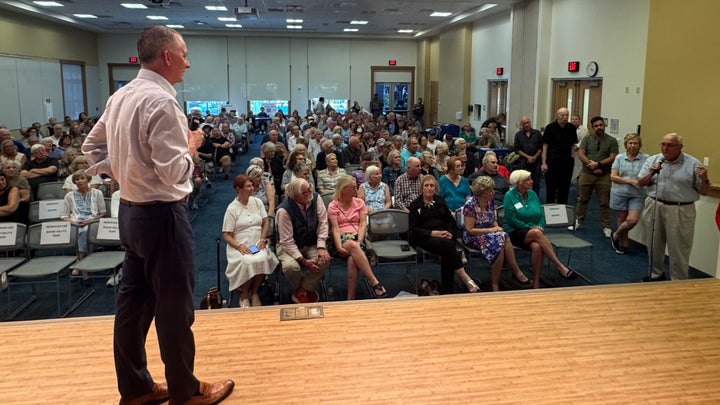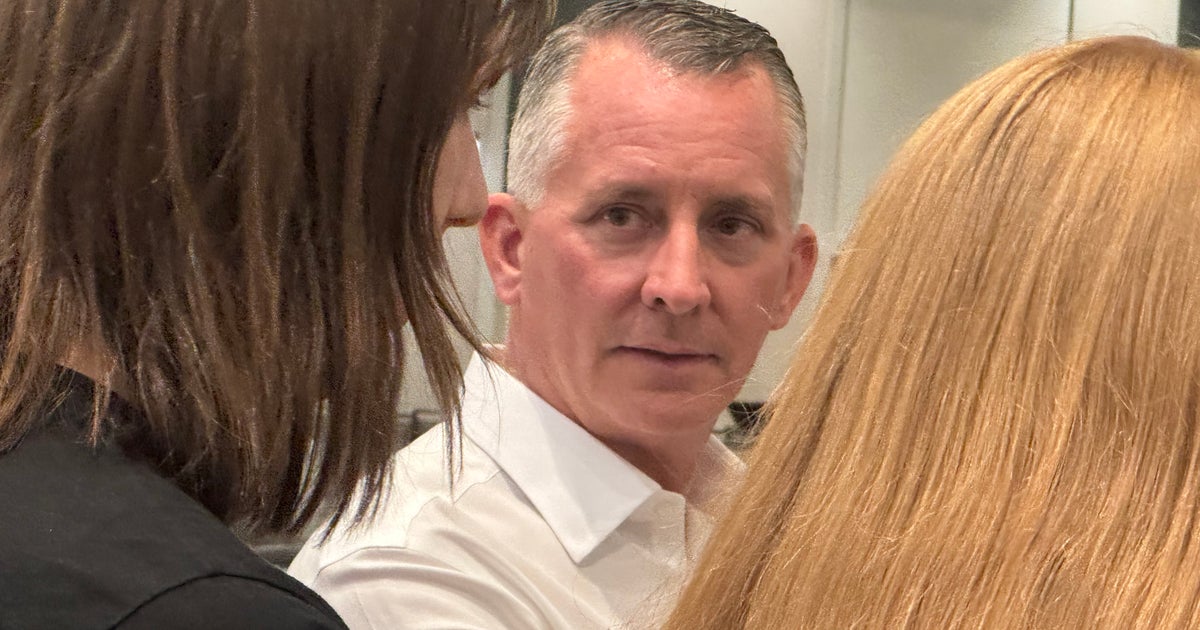NAPLES, Fla. ― David Jolly’s long-shot plan to win the keys to the governor’s mansion rests on a basic premise: that after seven years of Gov. Ron DeSantis and the return of President Donald Trump, Floridians have had it.
“I would not be in this race, I pledge to you, if we did not believe that in this moment, we’ve got the best shot we’ve had in 30 years to change the direction of the state,” he told more than 200 attendees who filled a meeting room at Collier County’s south regional library Monday.
“This is a moment when Florida voters are saying: ‘We have had enough,’” he’d told 400 Lee County Democrats in Fort Myers a day earlier.
Whether the recent Democratic convert and former Republican lawmaker’s analysis is correct will not be known for another year, when voters choose a successor to term-limited DeSantis. Until then, Jolly — who at this point does not have a well-known Democratic opponent for the nomination — said he plans to campaign for votes in all 67 Florida counties, a strategy that has largely fallen out of favor with Democrats since the 1980s, when they had near-total control of state government.
“We’ve done 94 events around the state since I started running for governor. Ninety-four,” he told a meet-and-greet session on Marco Island Monday night that attracted another 50 or so. “I am leaving it all on the field.”
Naples and Marco Island were the final two of a half dozen events he held over the Columbus Day weekend in one of the most Republican corners of an increasingly Republican state: southwest Florida, counties that have not voted Democratic in decades. Naples, the site of his Monday afternoon visit, is the home of Republican lawmaker Byron Donalds, who with Trump’s endorsement is likely to win the GOP nomination next August.
“We are in deep-red Naples, deep-red Collier County, and look at this turnout,” Jolly, who is 52, exulted as he took the stage, and then acknowledged the area’s reputation as a retirement haven. “It’s great to be the youngest person in the room!”
Perhaps to set low expectations, Jolly explained up front that he is not a “viral” candidate and promised not to get too deep into policy discussions, then went on to deliver a 45-minute stump speech that appeared to keep his audience engaged throughout.
 David Jolly, the likely Democratic nominee for Florida governor, takes questions from attendees to his town hall in Collier County on Monday.
David Jolly, the likely Democratic nominee for Florida governor, takes questions from attendees to his town hall in Collier County on Monday.
While Jolly followed the conventional wisdom that voters are most interested in pocketbook issues — “This is a state that is gripped by an affordability crisis” — he also spoke easily about matters that many consultants advise Democrats to avoid.
“We’re the home of culture wars that are giving people reason to pause and wonder whether or not Florida is a place where they feel welcome, whether their grandkids or kids feel welcome, whether your Canadian friends want to visit,” he said Monday. “And what my Republican friends really have never realized is culture wars have victims.”
Jolly, who is white and straight and married with young children, also defended DEI goals that have been vilified by both Trump and, at the state level, by DeSantis.
“It is not an attack on meritocracy to lift everybody up. It’s an improvement of meritocracy to do that. We should welcome everybody, and it is OK to embrace diversity in this state,” he said.
Only at the end of his remarks, which he delivered without notes, did Jolly even mention Trump, who last November won Collier County by a 66-33 margin over Democrat Kamala Harris. “Many of you in this room now ― you can look left and right ― have Googled Portugal,” he said, referring to the trend of Americans seeking refuge from Trump’s increasingly autocratic dictates.
He pointed out that he was the sole Republican member of Congress to call on Trump to drop out of the presidential race after he promised a Muslim ban when he ran in 2016. “I put my job as a Republican on the line to stand up to Donald Trump. I did that,” he said.
Nevertheless, he urged those inclined to support him to avoid even mentioning Trump to their Republican and independent friends and instead focus on the governor’s race.
“This is a race that allows an Andy Beshear to get elected in Kentucky, a race that allows Steve Bullock to get elected in Montana, and a race that allows David Jolly to get elected in the state of Florida,” he said.
“It is not an attack on meritocracy to lift everybody up. It’s an improvement of meritocracy to do that. We should welcome everybody, and it is OK to embrace diversity in this state.”
– David Jolly
Jolly, while clearly speaking primarily to people who were already inclined to support him, appeared to make a favorable impression.
“He communicates well. He doesn’t bloviate. He admits what he doesn’t know. He talks about trying to find out where we’re together and what we agree on, rather than why are we different,” 78-year-old Michael Finkel, a retired doctor, said after the Naples visit. “Quite refreshing.”
Retired sailmaker Carol Beers was in the audience the previous afternoon, when Jolly was the featured speaker at a fundraising luncheon for the Lee County Democratic Party in Fort Myers. She said it was the first time she had heard him in person and came away impressed. “People loved him,” she said.
Can that love from longtime party activists translate into winning a state in which the other party now has a 1.4 million registration advantage? On that point, Beers, who is 73, admits she’s not sure. “If he can’t do it, nobody can.”
Democrats have not won a governor’s race in Florida since 1994, when Lawton Chiles barely defeated Jeb Bush. When the second son of President George H.W. Bush ran again four years later and won, it was the start of a streak that now stretches seven elections.
What’s more, Democrats have only come close twice in those 24 years. If there’s a glimmer of hope for Democrats in that record, it could be Republican-turned-Democrat Charlie Crist’s near win in 2014 against the incumbent Republican, Rick Scott.
Crist, like Jolly, is also from Pinellas County in the Tampa Bay region and, like Jolly is doing now, ran as a centrist Democrat. Crist, though, had the advantage of five previous statewide runs, including one term in the governor’s mansion from 2007-2011 as a moderate Republican.
Don’tBuyTheir Lies
Your SupportFuelsOur Mission
Your SupportFuelsOur Mission
Shine a Light with Us
As the current administration celebrates the shutdown as an opportunity to advance their agenda, no one is there to hold them accountable, but we are. Our reporting ensures truth stays in focus. Join us today.
We remain committed to providing you with the unflinching, fact-based journalism everyone deserves.
Thank you again for your support along the way. We’re truly grateful for readers like you! Your initial support helped get us here and bolstered our newsroom, which kept us strong during uncertain times. Now as we continue, we need your help more than ever. .
We remain committed to providing you with the unflinching, fact-based journalism everyone deserves.
Thank you again for your support along the way. We’re truly grateful for readers like you! Your initial support helped get us here and bolstered our newsroom, which kept us strong during uncertain times. Now as we continue, we need your help more than ever. .
Already contributed? Log in to hide these messages.
Jolly has never run a statewide race before, which in Florida is a daunting task because of its vast size and 10 distinct media markets. Candidates must raise and spend tens of millions of dollars to reach the 10 million or so likely voters.
To date, Jolly has raised about $2 million. Republican Donalds has raised more than 15 times as much so far, although Jolly’s staff said Democratic money will likely flow if it appears by next summer that the race is winnable.

